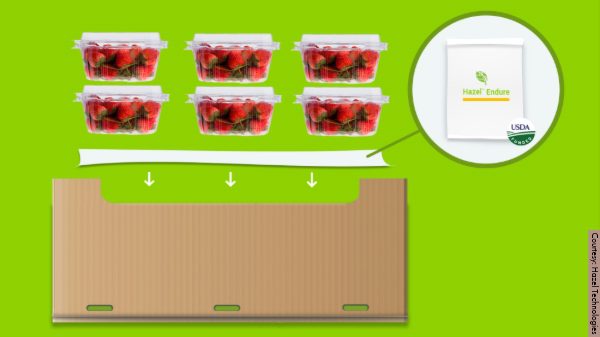
Can a simple sachet keep a box of avocados fresh for twice as long?
Chicago-based Hazel Technologies says it can and has proved it. Mission Produce, the world’s largest grower, packer, and shipper of Hass avocados, found that fruit that would normally have to be sold within two to five days lasted five to ten days with Hazel’s product. Once treated, avocados at maximum ripeness were still good two weeks later, according to Patrick Cortes, Mission’s senior director of business development, as reported in the Chicago Tribune.
“Hazel developed a way to block ethylene absorption by plants with a very simple, easy-to-use method,” says Minos Athanassiadis, director of Southern California-based Harvestmark-Trimble, who serves as an advisor to the company. “Traditional ethylene absorption solutions involved large warehouses and complicated to use systems.
“Hazel created a sachet, a small packet, of this product, that you can put in a box of avocados and stop the ethylene absorption in just that box of avocados, rather than requiring an entire storeroom as the apple folks and the banana folks do,” Athanassiadis adds.
The sachet can release the active product, called 1-MCP, for up to three weeks, the company claims, and works under storage conditions ranging from 0 to 22 degrees Celsius (32 to 71 Fahrenheit).
USDA’s Small Business Innovation Research program (SBIR) has shown its faith in the technology. A $100,000 grant reported this week brings the total of SBIR grants to Hazel up to nearly $1 million. At this point, the company has received some $18 million in total funding from private and public sources.
The product is also available for apricots, cantaloupes, honeydew melons, okra, and plums.
Can a simple sachet keep a box of avocados fresh for twice as long?
Chicago-based Hazel Technologies says it can and has proved it. Mission Produce, the world’s largest grower, packer, and shipper of Hass avocados, found that fruit that would normally have to be sold within two to five days lasted five to ten days with Hazel’s product. Once treated, avocados at maximum ripeness were still good two weeks later, according to Patrick Cortes, Mission’s senior director of business development, as reported in the Chicago Tribune.
“Hazel developed a way to block ethylene absorption by plants with a very simple, easy-to-use method,” says Minos Athanassiadis, director of Southern California-based Harvestmark-Trimble, who serves as an advisor to the company. “Traditional ethylene absorption solutions involved large warehouses and complicated to use systems.
“Hazel created a sachet, a small packet, of this product, that you can put in a box of avocados and stop the ethylene absorption in just that box of avocados, rather than requiring an entire storeroom as the apple folks and the banana folks do,” Athanassiadis adds.
The sachet can release the active product, called 1-MCP, for up to three weeks, the company claims, and works under storage conditions ranging from 0 to 22 degrees Celsius (32 to 71 Fahrenheit).
USDA’s Small Business Innovation Research program (SBIR) has shown its faith in the technology. A $100,000 grant reported this week brings the total of SBIR grants to Hazel up to nearly $1 million. At this point, the company has received some $18 million in total funding from private and public sources.
The product is also available for apricots, cantaloupes, honeydew melons, okra, and plums.
Richard Smoley, editor for Blue Book Services, Inc., has more than 40 years of experience in magazine writing and editing, and is the former managing editor of California Farmer magazine. A graduate of Harvard and Oxford universities, he has published eleven books.



